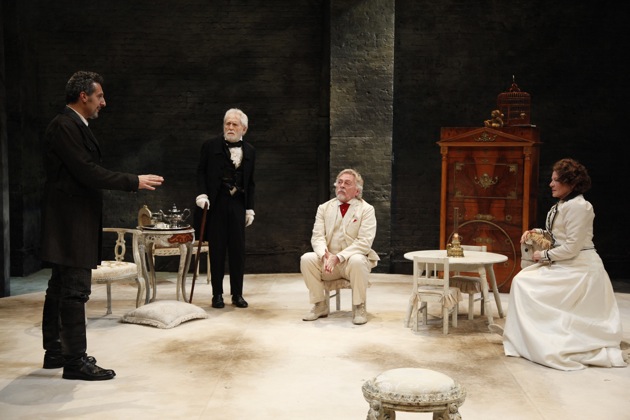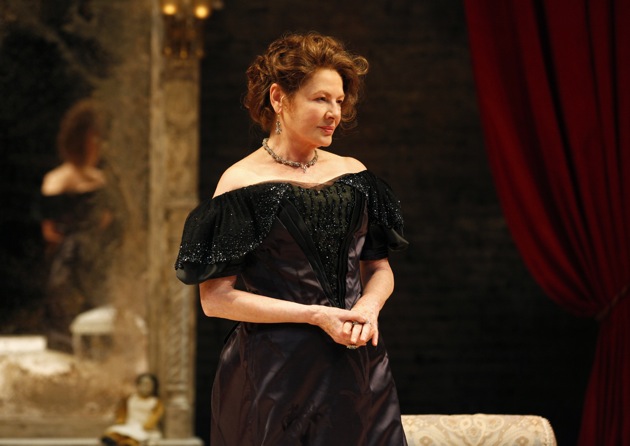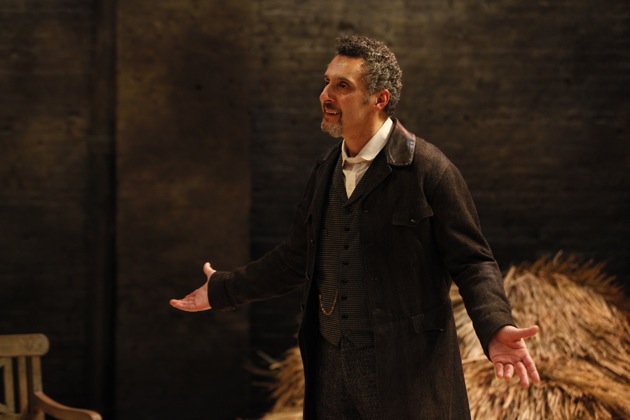Nabokov once described a fictional play in a story of his as “essentially idiotic, even ideally idiotic, or, putting it another way, ideally constructed on the solid conventions of traditional dramaturgy.” We all know the kind of thing he is talking about. The lengthy, character-revealing speeches, the unannounced guests who throw everything into confusion, the “dramatic irony,” the “rising action,” the over-neat ordering of life into three brisk acts—these are the solid conventions that keep us away from the theater or that make us wish we’d stayed away when we do end up there.
Chekhov, whose plays hardly seem to coerce life at all, boldly broke ranks with this wearying regimentation. His characters long to express their innermost desires, to perform heroic actions, to think deep thoughts, to love, to work for the betterment of humanity, but instead they find themselves saying things like
Why did I go out to lunch? It was quite vile, that restaurant of yours, with its beastly music; and the table-cloths smelt of soap, too…Need one drink so much, Liona? Need one eat so much? Today at the restaurant you talked too much again, and it was all so pointless. About the seventies, about the decadents. And who to? Fancy talking about the decadents to the restaurant waiters!
This is Madame Ranevskaya vaguely berating her garrulous brother, Gaev, in Chekhov’s last play, The Cherry Orchard, an impressive but uneven production of which is playing at the Classic Stage Company in New York. It is a typical moment that showcases Chekhov’s greatest artistic discovery, one without which much of twentieth century literature would be unimaginable: that plays and stories could be made out of life’s dross, the anti-drama and non-events that comprise so much of day-to-day life for most people.
Dianne Wiest is magnificent as Madame Ranevskaya in the new production; she understands perfectly that she is playing a woman wearing herself out through a relentless, and futile, effort to seem cheerful. The brittleness of her good humor is apparent from the moment she appears on stage in the first act, when she returns to her country estate in the early hours of the morning after five spendthrift years in Paris. As we quickly learn, the estate will soon be going up for auction in order to pay the family’s debts. The son of a former serf, Yermolai Aleksyeevich Lopakhin, who is now a successful businessman, has come to welcome her —and to propose a plan. If the family cuts down their cherry orchard and uses the land to build summer cottages, says Lopakhin (played by the excellent John Turturro, who does a fine job of seesawing between savvy bravado and touching insecurity), they will generate enough income to repay their debts and save the family estate. Sensible advice, but Madame Ranevskaya and her brother Gaev (the brilliant, blustery Daniel Davis), hobbled by a distinctly aristocratic blend of vanity and nostalgia (“This orchard is actually mentioned in the Encyclopedia,” protests Gaev), spend the remainder of the play refusing to act on it.
The poster for the new production shows the faces of Wiest and Turturro, both of them sporting expressions of Rushmoresque grandeur and solemnity; and yet, although Ranevskaya and Lopakhin probably speak the most lines, the remarkable thing about The Cherry Orchard is the way in which every role seems equally weighted with emotional salience and complication. Chekhov is always reminding us that every person is the hero of his or her own personal narrative. One of the most memorable performances in the production is Alvin Epstein’s Fiers, the doddering 87-year-old manservant whose conversational non sequiturs, at once poignant and hilarious, subtly come to embody the characters’ broader failures of communication, the way in which they are all tired of what everyone else has to say, but still want to speak constantly themselves. Near the start, right after Lopakhin has laid out his plan, Fiers cannot help himself from interjecting, and the following exchange occurs:
FIERS. In the old days, forty or fifty years ago, the cherries were dried, preserved, marinaded, made into jam, and sometimes…
GAEV. Be quiet, Fiers.
FIERS. And sometimes, whole cartloads of dried cherries were sent to Moscow and Kharkov. The money they fetched! And the dried cherries in those days were soft, juicy, sweet, tasty…They knew how to do it then…they had a recipe…
RANEVSKAYA. And where is that recipe now?
FIERS. Forgotten. No one can remember it.
The lines may seem a bit limp on the page, but Epstein delivers them with such urgency and conviction that there were audible sighs from the audience when he spoke the words “Forgotten. No one can remember it.” It felt like an irreparable loss.
Advertisement
Virginia Woolf complained of a 1924 production of The Cherry Orchard that the actors performed in a way that “brought them into touch with the audience but destroyed their harmony with each other.” Something similar happens in the current production. Too often the actors deliver their speeches directly to the audience, when really they should be speaking to, or at, one another; it made them seem like actors, putting on a performance. At the start of act two, when the hapless clerk Epikhodov (played by the gratingly twee Michael Urie) mentions that he can’t make up his mind whether “to live or shoot myself” and therefore always carries a revolver, he flashes the audience a glimpse of the gun. The moment felt like pantomime, as though Urie were winking at us, acknowledging his character’s ridiculous melodramatic habit. It drew a laugh, but the knowing gesture obscured a deeper level of theatrical self-consciousness: namely, the way in which Epikhodov doesn’t recognize the degree to which his personality is a theatrical cliché and how little his talk of suicide impresses his immediate audience, the other characters in the play.
At the end of Gogol’s The Government Inspector, the corrupt, incompetent, and, by this stage, comprehensively humiliated provincial governor laments that “some scribbler will write a comedy about” how he has just been swindled by a lowly clerk from St. Petersburg. “That’s what hurts. He’ll put it all in. My position! My struggles! He’ll show no mercy. And everyone will laugh and clap…” At which point he turns to the audience and says, “What are you laughing at? You’re laughing at yourselves!”
Chekhov seems to remember this moment in The Cherry Orchard, when he has Lopakhin say to to Madame Ranevskaya that yesterday he saw a “very amusing” play at the theater. Ranevskaya, so immersed in her own problems, seems unable to credit the idea that other people might be capable of enjoying themselves. “I’m sure it wasn’t at all amusing,” she snaps at him. “Instead of going to see plays, you should take a good look at yourself. Just think of what a drab kind of life you lead, what a lot of nonsense you talk!” Although we laugh at Ranevskaya’s self-absorption, it is hard for the audience not to feel these words as a rebuke—a rebuke made all the more stinging by the fact that we are not explicitly acknowledged; our presence suddenly feels like a dirty secret. Chekhov is less venomous, more compassionate than Gogol, but his comedy stings us for the same reason: we are always laughing at ourselves.





